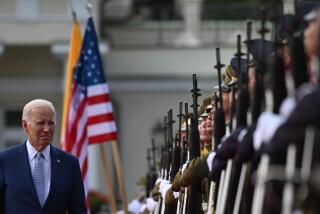NATO Turn Will Come, Albright Tells Slovenia
- Share via
LJUBLJANA, Slovenia — Secretary of State Madeleine Albright assured tiny Slovenia on Saturday that it remains a very strong candidate for NATO membership provided it solidifies its democracy, improves its economic climate for foreign investment and modernizes its army.
Albright came to this former Yugoslav republic to console its leadership about the U.S. veto that kept it from being invited to join the first round of expansion of the North Atlantic Treaty Organization last week.
“While there are no guarantees, there is no stronger candidate for the next round” than Slovenia, she told a joint news conference with Slovenian Foreign Minister Zoran Thaler.
Later, Albright flew to the Russian city of St. Petersburg, where she conferred with Foreign Minister Yevgeny M. Primakov over a three-hour dinner. Aides said the two discussed their positions on NATO’s eastward expansion, but “there weren’t any surprises.” Primakov and Russian President Boris N. Yeltsin have been outspoken in their opposition to the move.
Today, the Czech-born secretary of state flies to Prague, the Czech capital, to acquaint herself with the Jewish roots that until recently she did not realize she had. She plans to tour the ancient Jewish cemetery and nearby synagogue that is a monument to Czech Jews--including three of Albright’s grandparents--who died in the Holocaust.
Unlike President Clinton, who was cheered by tens of thousands of Romanians on Friday when he delivered a similar message of condolence to another rejected NATO candidate, Albright attracted no crowds during her brief visit to Slovenia.
A single demonstrator, holding a sign reading “God bless the partnership of Slovenia and the United States,” gave the only visible evidence that the Slovenian public even knew she was in their country.
In Romania, officials and people in the street seemed to concede that the country was not yet ready for alliance membership. By contrast, the Slovenes clearly thought that they should have been picked.
Slovenian Prime Minister Janez Drnovsek issued a news release paraphrasing Albright’s message to his country with a distinct spin.
“In her opinion, [the] Slovene government has done all that was necessary to include Slovenia as soon as possible in NATO and gained general recognition regarding Slovenia’s preparedness in the international community,” the statement read.
Well, not exactly.
Albright said Slovenia has “made a good start” at qualifying for NATO. But she said the country still has work to do. While saying there was “no stronger candidate” for the next round, expected about the end of the century, she said NATO membership is not a form of international recognition but a military alliance that bestows responsibilities as well as benefits on its members.
*
To qualify, she said, Slovenia must make sure democratic reforms continue, especially creation of a nonpartisan foreign policy; expand its economic reforms, including passing laws to make it easier for foreign investors to operate; and streamline and modernize its military.
Albright, noting that Slovenia’s existence as an independent country dates only from the collapse of the Yugoslav federation in 1991, said: “Slovenia is a new country and has had to embark on all three of those tracks in a shorter time” than Poland, Hungary and the Czech Republic, which were tapped for NATO membership in the first round.
A majority of NATO members supported Romania and Slovenia for inclusion in the first round. But Clinton, invoking a rule that requires all alliance decisions to be unanimous, limited the expansion to three countries.
More to Read
Sign up for Essential California
The most important California stories and recommendations in your inbox every morning.
You may occasionally receive promotional content from the Los Angeles Times.













